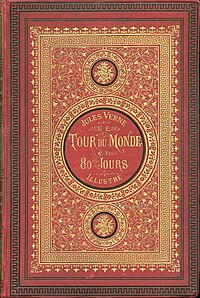
(first edition cover, courtesy of Wikipedia)
98. Verne, Jules. Around the World in 80 Days. 297 pages. 8.4.09.+
Around the World in 80 Days is the most recent book in the list of novels I have read to my son. Never having read Verne before I settled on our nightly routine, I found myself convinced that his novels would be good "boy books", and am pleased to say that I myself have found them very entertaining.
First published in 1873, Verne's narrative describing an eccentric gentleman's pursuit of a saloon wager is charming in its simple and straightforward presentation of what may be seen as typical 19th-century views and expectations. Although many of the stereotypes and presentations of British imperialism would be viewed as politically and socially incorrect to a modern audience, the innocence and casual frankness of Verne's depictions allow readers a glimpse at how the British may really have viewed their place in the global community. For this alone, I find the novel intriguing.
The characters of the novel are strangely underdeveloped, which allows the reader to focus more on the excitement of the journey as opposed to the emotional consequences suffered by the protagonists. Passepartout, Mr. Fogg's French valet, is arguably the most developed character, and proves to be an interesting addition as readers not only discover information about his rather colorful past, but are likewise pacified in the desire for emotion that is markedly absent from the figure of Phileas Fogg himself.
In the end, I enjoyed Around the World in 80 Days much more interesting than our reading of Journey to the Centre of the Earth, despite (or perhaps because of) its simplicity of plot and character. Verne's 1873 novel frequently appears on reading lists for young teenagers, and I strongly agree with the recommendation; I can't wait until Brooks has a chance to read it for himself.

99. Kenyon, Sherrilyn. Acheron. 816 pages. 8.4.09.
It's hard to give this book a fair rating. I enjoyed learning of Acheron's past, but for every interesting passage or chapter there is an equally dull or tedious one.
No comments:
Post a Comment